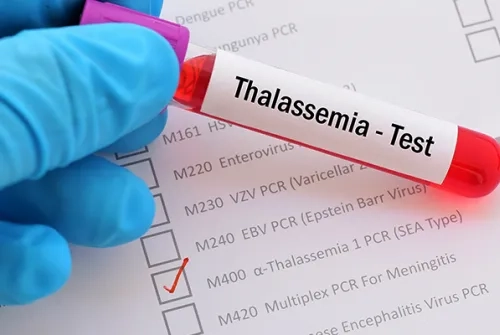Alo Yeditepe
Alo Yeditepe
Precautions Must Be Taken Against Loss of Life Due To Infection in Thalassemia
Thalassemia, which has a high individual and social cost, is of particular importance for our country due to the frequency of consanguineous marriages. Stating that this situation both increases the frequency of diseases and unfortunately causes hundreds of sick children to be born every year, Infectious Diseases and Clinical Microbiology Specialist Prof. Dr. Meral Sönmezoğlu made important statements due to "World Thalassemia Day". Pointing out the measures taken in the name of protection and the importance of screening couples to be married before marriage, Prof. Sönmezoğlu also explained what needs to be done to protect patients from infections.
Thalassemia, the most common genetic disease known in the world, is defined as a genetic disorder of hemoglobin synthesis, which has the task of transporting oxygen. Yeditepe University Hospitals Infectious Diseases and Clinical Microbiology specialist Prof. Dr. Meral Sönmezoğlu said that they could only find out when they had a child with thalassemia or when they had a blood test that was special for the disease.
“Known as Mediterranean Anemia in Our Country”
The high number of consanguineous marriages in our country increases the frequency of thalassemia, a genetically transmitted disease. Unfortunately, hundreds of diseased children are born every year. Prof. Dr. Meral Sönmezoğlu gave the following information about the symptoms of the disease: 'Beta Thalassemia is the most common disease in our country in the thalassemia disease group, which is among the diseases called "hemoglobinopathy". Beta Thalassemia is known as "Mediterranean Anemia" in our country. This disease causes a decrease in the oxygen transport of the blood to the tissues and organs due to the insufficiency and disorder in hemoglobin production. As a result, pallor, weakness, rapid fatigue, palpitations, and developmental retardation occur in patients. With excessive stimulation of the bone marrow for blood production and further work, disease-specific enlargement occurs in the facial bones.”
“Thalassemia Status in Turkey”
Stating that screening programs are extremely important because the treatment is very corrosive for the patient and his family, Prof. Sönmeoğlu gave the following information about the studies on this subject in our country:
''The prevalence of beta-thalassemia carriers in the healthy Turkish population is 2.1 percent, and there are approximately 1.400.000 carriers and 4513 patients. The total number of patients with thalassemia is approximately 6,000. Ministry of Health published the Regulation on Inherited Blood Diseases on 24.10.2002. The Hemoglobinopathy Control Program has been initiated to prevent hereditary blood diseases including thalassemia in 33 provinces determined by the Ministry. While screening was carried out in 41 provinces in 2013, it has become mandatory for all couples to have this test before marriage in 81 cities with a 100-day action plan since 2018. As of 01 November 2018, the program has been implemented by family physicians as a Premarital Hemoglobinopathy Screening Program in 81 provinces. With these studies, the number of children born with thalassemia decreased from 300 to 30 per year.”
“Treatment Varies Based on the Symptoms of the Disease”
Stating that thalassemia treatment differs according to the complaints and symptoms experienced by the patient, Prof. Dr. Meral Sönmezoğlu also added: “The most applied and effective way for anemia is blood transfusion. Thalassemia major patients often receive this treatment every month. Depending on the transfusions performed, the iron accumulated in the body is removed with special iron binding treatment (chelation treatment). Today, stem cell and gene therapy, prenatal diagnosis and preimplantation genetic diagnosis methods are also used.”
“The Most Important Complication Infections”
Drawing attention to the difficulty of treatment for thalassemia patients as well as the fact that infections pose a significant risk, Prof. Dr. Meral Sönmezoğlu: “Infections are the second most common cause of death and one of the leading causes of morbidity in thalassemia patients. Preparatory factors in thalassemia patients include deep anemia, iron loading, spleen removal, and some immune disorders. The main causes of bacterial infections are Klebsiella spp in Asian countries and Yersinia enterocolitica in western countries.”
What Should be Done to Protect Thalassemia Patients from Infection?
Since thalassemia major patients receive two units of blood transfusion almost every month during their lives, this treatment is also a risk factor for infection transmission, Prof. Dr. Meral Sönmezoğlu continued her words as follow: “The most common diseases are viral infections. Although blood donors are questioned and screened for disease and a safe blood supply is provided, this risk still exists, as in every country in the world. Therefore, all thalassemia patients should be vaccinated against hepatitis B disease that can be protected by vaccination. Also, to prevent infections: Thalassemia patients should be treated immediately when they have a febrile illness. It should be prevented from turning into a systemic disease. If the spleen of thalassemia patients is removed, they should be vaccinated against encapsulated bacteria. Thalassemia patients should not consume raw meat, milk, shellfish, and fresh cheese, which can be a source of infection.”
“The Most Effective Method of Protection is to Increase Social Awareness”
In the treatment of thalassemia, which can be quite challenging today, according to today's data, a patient's annual cost to the state is around 10 thousand dollars, Prof. Dr. Sönmezoğlu: "The most effective method in controlling hereditary diseases that are transmitted by faulty genes from both parents such as thalassemia is to inform the society about the disease, to identify carriers through community screenings, to give genetic counseling to them and to prevent new sick baby births by using pre-pregnancy diagnostic methods. Thalassemia has been controlled in many countries.”
“People Living in Risk Areas Should Get Tested Before Marriage"
Reminding that since thalassemia carriers in the community have a normal appearance, it will not be possible to understand whether they are carriers unless special thalassemia tests are performed, Yeditepe University Hospitals Infectious Diseases and Medical Microbiology Specialist Prof. Dr. Sönmezoğlu: “For this reason, young people living in risky areas should definitely have a thalassemia test before marriage.”
Stating that in the hemoglobinopathy control program, couples to be married before marriage are screened and other family members and relatives of individuals who are sick or carriers are screened, Prof. Dr. Sönmezoğlu: “In addition, it is of particular importance to implement Hemoglobinopathy training and screening programs for students studying in secondary education as parents of the future. Apart from these, a hemoglobinopathy test can be performed at the discretion of the physician or the person."
About
Faculty and Year of Graduation:
Medical Faculty of Ankara University, 1984
”
See Also
- What is Hepatitis B? What are its symptoms? How is it Transmitted?
- What is HMPV Virus? HMPV Symptoms and Ways of Transmission
- Why Is the Flu Lasting Longer This Year?
- What Precautions Should Be Taken Against the Cold Epidemic?
- Don't Be Late Fighting Against Diseases
- Antibiotics Kill Beneficial Bacteria, Not Viruses
- What is Hepatitis? What are the Symptoms and Treatment Methods?
- Symptoms and Treatment of Tick Bites
- Summer Infections
- Information on H1N1 (Swine Flu)
- Summer is Coming... Beware of food poisoning!
- Our Taboos Affect the Increase in the Number of HIV-Positive Cases in Turkey
- Strep A Symptoms and Treatment
- Do Not Put a Cigarette Butt or Pour Olive Oil or Liquid Soap on the Tick
- Reheat the Food You Cooked Only Once!
- HIV Can Be Hidden for 10 Years without Any Symptoms!
- 290 Million People Live Without Knowing They Have Hepatitis
- Things to Consider When Touching Meat at Eid
- What Is Anthrax Disease?
- The Way to Fight AIDS is to Raise Awareness First
- Still Not Too Late For Flu Vaccine
- What is Rhinovirus?
- Fighting with Thalassemia: Meral Yılmaz
- Thalassemia Spreads from the Mediterranean to the Whole of Europe with Migration!
- Early Treatment of Crimean Congo Hemorrhagic Fever is Vital
- Approximately 3 Million Patients Need Blood Transfusions Every Year in Turkey
- When to Get the Flu Vaccine
- Antibiotics Account For 14% of Prescription Costs
- West Nile Virus Replaces Malaria
- It Is Necessary to Try to Be Healthy in order to Be Protected
- A New Flu Outbreak is Expected Every 10 Years
- 63% of Vector-Borne Diseases are Caused by Lyme Disease
- Experts Warn About Flu Risk
- Mosquito Infection Risk
- Why aren’t Antibiotics Working Any More?
- The World Raises an “Alarm” on Antibiotic Resistance!
- What is COVID-19?
- The Mask Requirement was Removed and the Importance of Social Distance Increased!
- How to Prevent COVID-19 in School-Going Children
- WHO (World Health Organization) Warns for Antibiotic Resistance!
- Who Is Threatened by Monkeypox?
- Ways to Prevent Coronavirus
- Swine Flu / H1N1
- Life Returns to Normal with Caution
- What is Monkeypox Virus? What Are the Symptoms of the Monkeypox Virus?
- What is Lyme Disease?
- How to Tell if You Have a Mild Coronavirus?
- Pay Attention to These Rules for COVID-19
- Hand Sanitizer Usage Guide
- The Priority Rule for the Protection from Summer Infections is Hygiene
Alo Yeditepe




